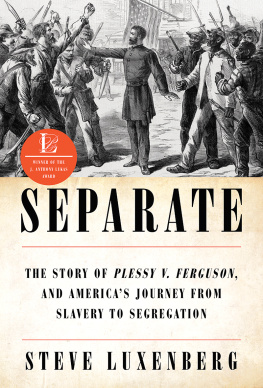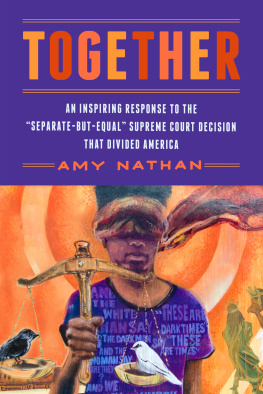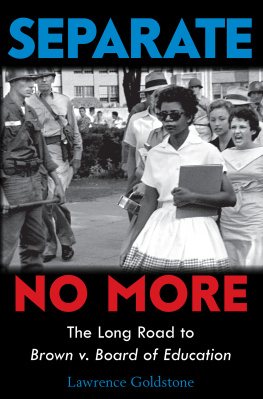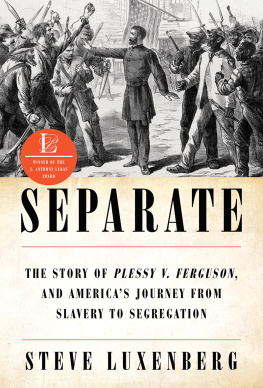

To Mary Jo,
forever equal and never separate
To Josh and Jill,
inspirations always
O N JUNE 18, 1900, census enumerator John E. Duffs walked the streets of New Orleanss Seventh Ward, knocking on the doors of more than thirty households, collecting the bits of information he needed for the twenty-eight boxes on his questionnaire sheets. He had instructions for each entry, including Box 5, Color or Race. The directions were simple enough: Write W for White. B for Black (negro or negro ancestry). Ch for Chinese. Jp for Japanese. In for Indian, as the case may be.
No need for any of those last three designations on todays visits. As for the first two, well, they posed a challenge for Duffs. He no longer had the option of Mu for mulatto, a category in previous censuses, well used in New Orleanss French-speaking neighborhoods. Like a train conductor surveying the cars on the East Louisiana Railroad, the enumerator had only two choices for the multihued families on his route. White. Black. Not FC for French Creole, or Mi for mixed, or O for other. White. Black.
Duffs was nearing the end of his day when he reached the little rented house at 1438 North Roman Street where Homer and Louise Plessy lived, along with Louises mother. When Duffs left, he had the 1900 censuss answer to the question that Albion Tourge and James Walker had posed in their brief to the Supreme Court: What color was Homer Plessy? He was B. He would be B again in 1910, even though Mu had been restored as an option, and thats what Plessy had been in the 1880 census. Then, in 1920, at the age of fifty-seven, Plessy would be W, completing his journey across the color spectrum and leaving a paper trail of racial confusion that would have delighted Tourge.
The Plessy case had already slipped into the shadows of the citys history. It had come to a quiet end on January 11, 1897, when Plessy and Walker returned to Criminal Court A for a proceeding that merited no coverage at all in either the Picayune or the Times-Democrat. Judge Ferguson, his term up, was no longer sitting. His replacement, Joshua Baker, would handle the case from here.
The case had been docketed as an arraignment, the first step toward a trial. But the Citizens Committee had no interest in a lingering battle that couldnt be won. Plessy changed his plea to guilty. Baker imposed the minimum twenty-five-dollar fine, the committee paid it, and the test case went into the records as one more conviction, indistinguishable from the dozens of others that Baker would preside over in the coming weeks.
A few months later, the committee issued a formal report laying out its reasons for challenging the Separate Car Act. Louis Martinet, Rodolphe Desdunes, and the committees other members had heard the criticismslost cause, misguided strategyand declared their belief that they had taken the right course, that pursuing justice cannot be done without risk. They praised Harlans dissent as a courageous stand for justice and equal rights, and then the committee dissolved. The Crusader, already in financial distress before the Supreme Courts ruling, went silent. Seeing that the friends of justice were either dead or indifferent, [the editors] believed that the continuation of the Crusader would not only be fruitless but decidedly dangerous, Desdunes wrote later in his history of Creole leaders, published in French.
Like Martinet, who grew so discouraged that he eventually withdrew from the public arena, Tourge had found the loss in Plessy hard to take. He was exhausted, personally and by the race issue. His devotion to civil rights activism had come at the expense of his writing career. A fall trip to New York, seeking a magazine job, left him feeling sorry for himself. I have nothing to say that the world cares to hear, he wrote to Emma, a reprise of his pre-Bystander blues. I dont want to come home, or try anything else. I merely want to die.
He had campaigned hard for Ohios William McKinley in the 1896 presidential election, and when McKinley won, Tourge sought a foreign post. For some months, it looked as if he might not get one. He was too controversial, some said, for a prominent posting. Friends from both races lobbied on his behalf. Emma made a special trip to Washington to make a plea. In May 1897, the appointment came through. Tourge would go to Bordeaux, France, as the U.S. consul there. Martinet telegraphed his sincere congratulations. Left unsaid: The countrys best-known white advocate for civil rights was absenting himself from the field, at least for now.
A year later, in July 1898, James Walker died in New Orleans. His lengthy obituary in the Times-Democrat contained a remarkable error, never corrected. He had charge of some very important cases in the city, the Times-Democrat wrote, and some time ago went to Washington, where he gained a decided victory in the Jim Crow car case.
PRESIDENT THEODORE ROOSEVELT almost didnt make it to the special tribute for John Harlan on the night of December 9, 1902. He was sorry, very sorry, he had told his attorney general a few weeks earlier, but he had other commitments. The countrys legal elite, aided by congressional and cabinet officers, would have to celebrate Harlans twenty-fifth anniversary on the Supreme Court without a presidential speech.
But by the time the 280 guests had gathered that evening at the New Willard Hotel in Washington, word had spread. Roosevelt would be there. The printed program had him arriving at nine oclock, somewhere between the mignons de filet de boeuf a la Cheron and the glaces assorties. The president would speak first, naturally, then Harlan, then seven others. It would be a night of accolades and humility, of high-minded oratory and humorous barbs, of honoring a man and an institution. Dissent would have the evening off. Or so it seemed.
The master of ceremonies was Harlans old friend, Wayne MacVeagh. The Pennsylvanian had toiled with Harlan on the Louisiana election commission in 1877, and impressed with the Kentuckians temperament, had urged President Hayes to pick Harlan for the Supreme Court. On either side of Roosevelt and Harlan, at the long head table, sat Chief Justice Fuller and the rest of his colleagues, along with Harlans three sons. James had traveled from Puerto Rico, where he was serving as the territorys attorney general. John, a lawyer, and Richard, a minister, had journeyed from their homes in Chicago.
The invitation list, drawn up by the bar, was exclusively male, but special provisions had been made for Mallie, to her delight. From her seat in the balcony, she and the rest of the Harlan entouragedaughters, daughters-in-law, close friendshad an aerial view of the entire floor. John rambled the room, bursting with good cheer, beaming with pride. He could retire with full pay next year, when he reached seventy, if he so desired.
He did not so desire. He desired to stay on the bench, to keep making his mark. Six years earlier, in a bantering letter to Fuller, he had given his boss some advice for the October 1896 term. Assign yourself fewer cases. Were in our sixties now. We dont want to wear out. I have often heard men say that they were quite willing to die when the time comes, but I never believed any one said it in good faith, Harlan joked. The fact is, I am afraid to die; for it might be my sentence that I should spend the balance of my days at Democratic headquarters.
Harlan, a Republican, and Fuller, a Democrat, enjoyed their good-natured jabs. Harlan told Fuller that he intended to stay on the bench until December 10, 1927, the date of his fiftieth anniversary. Of course, he would be ninety-six then. Only a handful of justices had made it to their eighties. The court was a lifetime appointment, but it was not a job for a worn-out man. Harlan had seen colleagues in the throes of decline, the anguish of it. His friend Henry Brown was coping with his failed right eye. For now, Harlan had no such worries. He was still strong at sixty-nine, a few steps slower and a score of pounds heavier, but still engaged, still energetic.
Next page






